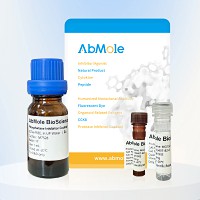All AbMole products are for research use only, cannot be used for human consumption.

Species: Human
Expression system: CHO
Purity: SDS-PAGE analysis, > 95%, HIGH performance liquid chromatography analysis, > 95%
Endotoxin: protein < 0.2 EU/μg was determined by gel coagulation
Apparent molecular weight: 8~ 10kda, sds-page under reduction conditions
Storage and stability: After receiving, the product remains stable at temperatures below -70°C for up to 6 months. After recombination, the product should be stable at 4°C for 1 week or -20°C for 3 months. For long-term preservation, carrier protein (e.g. 0.1% BSA) is recommended. Avoid repeated freeze-thaw cycles.
Bioactivity: ED50 < 100.0 ng/ mL, calcium flux was measured using CHO/Gα15 cells expressing CCR5. Mip-1 α polymorphism is associated with HIV susceptibility or drug resistance. Recombinant MIP-1 α induces dose-dependent suppression of HIV and SIV infection. In response to endogenous and exogenous factors such as interleukin-1 β, interferon -γ, and gram-positive bacterial lipoteichoic acid, monocytes can secrete large amounts of MIP-1α. Mip-1 α enhances the adhesion of T lymphocytes, monocytes, and neutrophils to vascular cell adhesion molecule 1. In addition, miP-1 α accelerates tissue repair by chemically attracting macrophages during trauma.
| Solubility (25°C) | It is recommended that this vial be briefly centrifuged prior to opening to bring the contents to the bottom. Reconstitute the lyophilized powder in ddH₂O or PBS up to 100 μg/ml. |
| Storage |
Powder -20°C 3 years ; 4°C 2 years In solvent -80°C 6 months ; -20°C 1 month |
[4] C Blanpain, et al. Blood. CCR5 binds multiple CC-chemokines: MCP-3 acts as a natural antagonist
| Related Cytokines and Growth Factors Products |
|---|
| Recombinant Human GDF-15 Protein (HEK293 N-hFc)
Growth-differentiation factor 15 (GDF15), also known as MIC-1, is a secreted member of the transforming growth factor (TGF)-β superfamily. GDF-15 has a role in regulating inflammatory and apoptotic pathways in injured tissues and during disease processes. GDF-15 overexpression arising from an expanded erythroid compartment contributes to iron overload in thalassemia syndromes by inhibiting hepcidin expression. |
| Recombinant Human FGFR1 Protein (HEK293, C-His)
FGFR1, also known as CD331, is a full-length representative protein consists of an extracellular region, composed of three immunoglobulin-like domains, a single hydrophobic membrane-spanning segment and a cytoplasmic tyrosine kinase domain. |
| Recombinant Human FGFR2 Protein (HEK293, C-His)
FGFR2, also known as CD332, acts as cell-surface receptor for fibroblast growth factors and plays an essential role in the regulation of cell proliferation, differentiation, migration and apoptosis, and in the regulation of embryonic development. FGFR2 plays an essential role in the regulation of osteoblast differentiation, proliferation and apoptosis, and is required for normal skeleton development. It also promotes cell proliferation in keratinocytes and imature osteoblasts, but promotes apoptosis in differentiated osteoblasts. |
| Recombinant Mouse BMP-4 Protein (E. coli, C-His)
Bone Morphogenetic Protein-4 (BMP-4) is a critical signaling molecule required for the early differentiation of the embryo and establishing of a dorsal-ventral axis. BMP-4 is secreted from the dorsal portion of the notochord, and it acts in concert with sonic hedgehog to establish a dorsal-ventral axis for the differentiation of later structures. |
| Recombinant Human Coagulation Factor X (HEK293, C-Fc)
Coagulation factor X, belongs to the peptidase S1 family. Coagulation factor X is initially synthesized in the liver. Coagulation factor X is a vitamin K-dependent glycoprotein that converts prothrombin to thrombin in the presence of factor Va, calcium and phospholipid during blood clotting. |
All AbMole products are for research use only, cannot be used for human consumption or veterinary use. We do not provide products or services to individuals. Please comply with the intended use and do not use AbMole products for any other purpose.


Products are for research use only. Not for human use. We do not sell to patients.
© Copyright 2010-2024 AbMole BioScience. All Rights Reserved.
